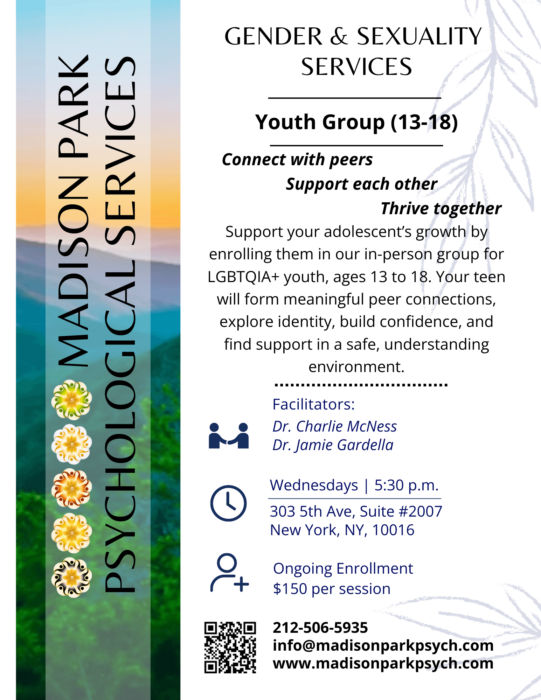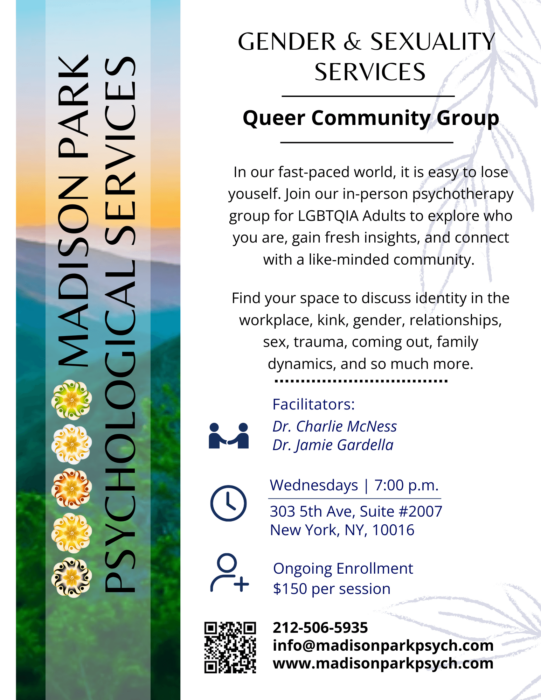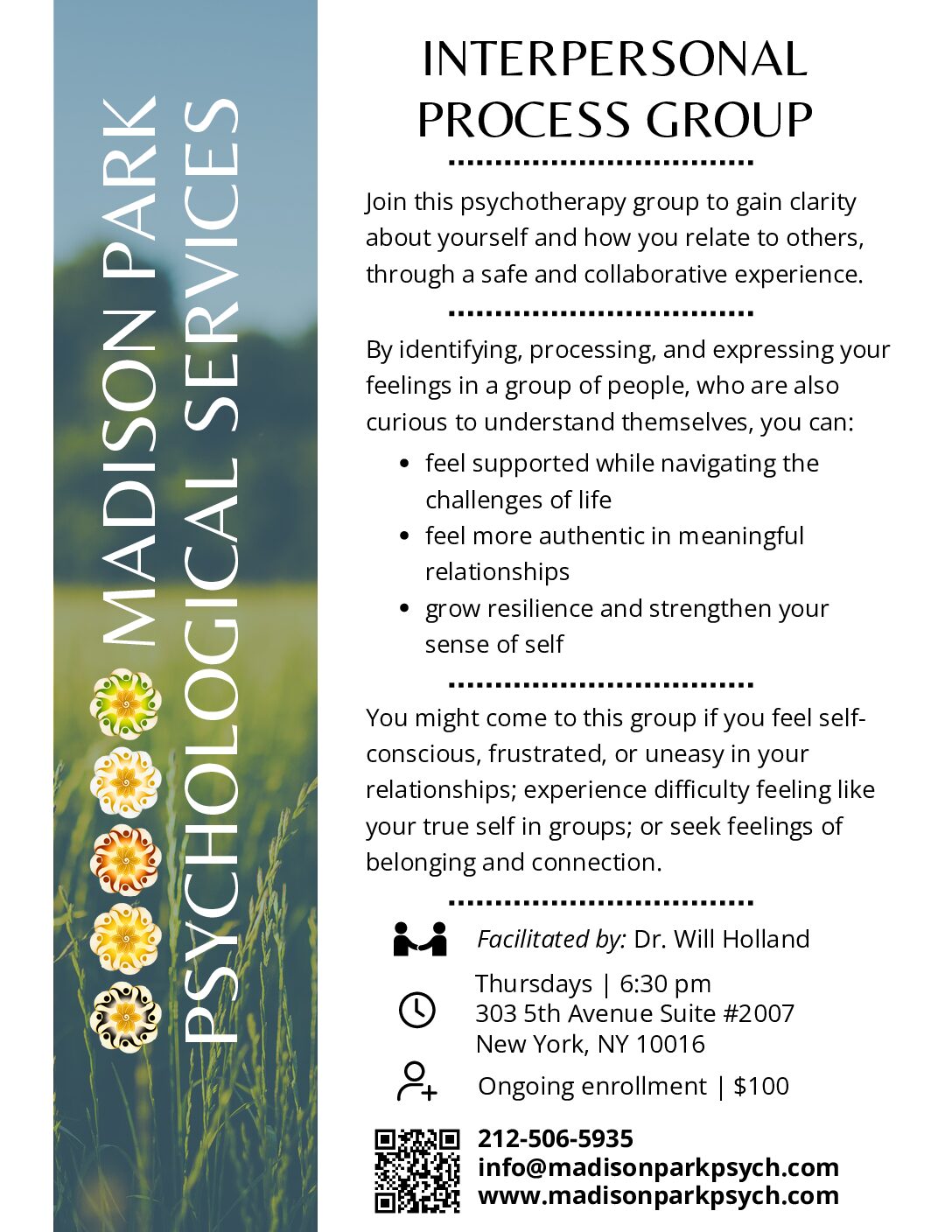Group Therapy in NYC
Group Therapy in NYC
Community care is extremely powerful.
Interacting, listening to different perspectives, and learning from others can help us heal, even during the most difficult times. You may be struggling with anxiety, depression, anger management issues, or chronic stress. Perhaps you are having relationship problems with your loved one and can’t seem to get past them. Or maybe you are battling with dysfunctional eating behaviors that deeply affect your well-being. While it’s easy to think you are stuck in your pain, please know you are not alone. Hardship is a common human experience shared by most of us, regardless of our unique stories. But we can navigate and overcome life’s challenges with the proper support. Group therapy opens a safe space for you to connect, feel seen by those going through similar hurdles, and ultimately grow alongside them. At Madison Park Psychological Services, we offer group therapy and other services to help teens and adults living in NYC and nearby areas. Read on to learn more about group therapy and how it can help you. Ready to try group therapy? Book an appointment or contact us today.
Do You Need Group Therapy?
Group therapy is a psychotherapy format where a therapist offers counseling to a group of five to 10 people simultaneously. This treatment aims to create a welcoming environment for members to observe, listen, and participate as they manage challenges and learn valuable strategies—all with the guidance of a therapist. Group counseling can help children, teens, and adults with a wide range of mental health difficulties, including:
- Anxiety
- Anger management
- Chronic stress
- Communication problems
- Depression, loneliness, or low self-esteem
- Eating disorders or disordered eating
- Fears or phobias
- Grief and loss
- Panic attacks
- Relationship issues
- Trauma or Post-Traumatic Stress Disorder (PTSD)
- And more
If you or someone you love is suffering from any of the above issues, group therapy can help. However, you don’t have to struggle to benefit from this treatment. Group therapy allows you to learn new social skills and improve your interpersonal abilities. It’s also an excellent way to complement your individual therapy journey—if you have embarked on one.
Current Groups at Madison Park Psychological Services
Dialectical Behavior Therapy Skills Group
Time: Mondays @ 5:30-7:00 pm ET
Location: In-person
Price: $187.50 / session
Time: Wednesdays @ 6:00-7:30 pm ET
Location: Virtual
Price: $187.50 / session
If you are having trouble managing and controlling big emotions and you often feel like emotions get the best of you during interactions with others DBT skills group is the intervention you have been looking for.
DBT skills group is a didactic group setting, structured in three 8 weeks long modules and you can join the group at the beginning of each module. We teach Distress tolerance Skills where you learn to navigate crisis situations without making things worse, Emotion Regulation Skills where you learn how to better understand emotions, and how to change unwanted emotions and Interpersonal Effectiveness Skills where you learn how to get interper-sonal needs met, while maintaining relationships and increasing self respect. Mindfulness Skills, where you practice gaining control of your mind and at-tention are incorporated in all three modules.
The group is facilitated by Dr. Adella Nikitiades. Reach our office at 212-506-5935 or email us at info@madisonparkpsych.com


Gender & Sexuality Services Queer Community Group
Time: Wednesdays
@ 5:30 pm ET – Youth Group (13-18)
@ 7:00 pm ET – Adult Group (18+)
Location: In-person
Price: $150 / session
The group is facilitated by Dr. Charlie McNess and Dr. Jamie Gardella. Reach our office at 212-506-5935 or email us at info@madisonparkpsych.com


Interpersonal Process Group
Time: Thursdays
@ 6:30 pm
Location: In-person
Price: $100 / session
Join this psychotherapy group to explore how you relate to others in a safe and supportive space. Led by Dr. Will Holland, this group helps you process emotions, strengthen your sense of self, and build meaningful relationships. Whether you struggle with self-expression, social anxiety, or finding a sense of belonging, this experience fosters personal growth and resilience.
The group is facilitated by Dr. Will Holland. Reach our office at 212-506-5935 or email us at info@madisonparkpsych.com

Group Therapy Procedure & Techniques
Group therapy is facilitated by one or more licensed therapists who have the experience to offer evidence-backed advice and resources to all participants. Groups can be open to the public or closed to allow only certain members to join. Treatment can be free-form or structured. During free-form groups, members typically have the freedom to lead the conversation with the counselor’s support. Structured groups may have a schedule or exercises outlined by the therapist.
Common types of group therapy include:
- Cognitive-behavioral group therapy — Helps recognize and shift negative thoughts, emotions, and behavior patterns.
- Process-oriented or interpersonal group therapy — Leverages members’ interactions as a healing mechanism.
- Psychoeducational group therapy — Teaches participants about a distinct mental health challenge and the coping strategies to navigate it.
- Skills development group therapy — Aims to educate or improve social, emotional, or behavioral skills.
Regardless of the approach or type of group, group therapy tends to follow the below guidelines:

1. Commit to Attend
Attending all or most sessions is essential to your success and the success of your fellow group members. All participants are encouraged to show up and bring their whole selves unless an emergency occurs.
2. Maintain Confidentiality
Anything shared during group therapy is entirely confidential and kept within the group. This includes information, interactions, names, and other personal details.
3. Respect Privacy
While we motivate you to share your story and struggles with the group, you are not obligated to answer any questions, partake in activities, or say anything you are not comfortable with. We also ask members to never pressure other participants into doing so.
4. Do Not Engage in Violence or Harmful Behavior
Violence, intimidation, or hazing will not be tolerated during group therapy. Likewise, you are not allowed to participate under the influence of any substance. The goal is to protect everyone’s safety as you open up and embrace vulnerability.
What to Expect From Group Therapy
Benefits of group therapy include:
- Realizing you are not alone in your struggles
- Increasing your hope and sense of belonging
- Building self-awareness and confidence
- Broadening your perspective as you listen to members’ experiences and receive their feedback
- Becoming more accountable for your actions and recognizing how they impact yourself and others
- Learning tools and strategies to manage challenges
- Practicing and sharpening interpersonal skills
At Madison Park Psychological Services, we provide group therapy, along with individual therapy, couples therapy, family therapy, and psychological assessments. Our team of mental health professionals has a wealth of experience in different therapy approaches, including Cognitive-Behavioral Therapy (CBT), Dialectical Behavior Therapy (DBT), Interpersonal Therapy, Relational Therapy, and more. Our goal is to tailor treatment to your needs so you can find ease and achieve lasting results.
Virtual Group Therapy NYC
We offer online group therapy to accommodate your needs and meet you where you are—at your home, office, or a location of your choosing. Our group teletherapy service works similarly to our traditional sessions. We start with an initial consultation to get to know you and walk you through our process. Next, we’ll find the right therapist, group, and modality for you. While teletherapy can feel intimidating and isolated compared to in-person therapy, rest assured we have the training and capabilities to provide you with a confidential and comfortable environment. If you have any questions about our virtual group therapy, reach out to us!
Booking an Appointment for Individual Therapy
Ready to get started? Book an appointment or call 212-506-5935 with any questions!
Group Therapy FAQs
How to evaluate the effectiveness of group therapy?
According to the American Psychological Association, group therapy may be an effective treatment for depression, panic disorder, post-traumatic stress disorder (PTSD), social phobia, and eating disorders, among other conditions. You can evaluate the effectiveness of group therapy by looking at your recovery progress, ease of symptoms, skill development and improvement, and overall behavior change. Remember, the effectiveness of therapy will rely on finding the right fit. That’s why we strive to match you with a therapist, modality, and group according to your needs and situation.
How to build trust in group therapy?
Telling your story can be challenging, particularly if you are uncomfortable around groups or struggle with social anxiety. You may be unsure about what to expect and wonder if you can trust others. To build trust with participants and your therapist, we recommend being patient and giving yourself time to be comfortable in the group setting. Listen with intention, do not feel pressured to participate, and share only when ready.
How long does group therapy last?
Group therapy length can vary depending on the type of group, targeted mental health challenge, and members. Your goals, symptoms, and progress may also impact how long your treatment will last. Some groups might have a specific duration, while others may remain open-ended throughout the year. If you have any questions about our group therapy service, let us know!
How long does a group therapy session last?
Group therapy sessions are generally scheduled once or twice a week, lasting between one to two hours depending on the group.
What is the goal of group therapy?
The goal of group therapy is to leverage the members’ interactions, learnings, and shared experiences, as well as the therapist’s guidance, to help you address challenges and develop practical coping techniques.
Does insurance cover group therapy?
If you have out-of-network insurance coverage for behavioral health services, your insurance company might cover group therapy (fully or partially). Review your out-of-network information to confirm the exact services covered by your insurance plan. We offer lower rates if you have to pay out of pocket or don’t have enough coverage. Contact us for more information!
Call or Book An Appointment Today!
We'll design an effective, individually tailored treatment to help you reach optimal health and well-being.